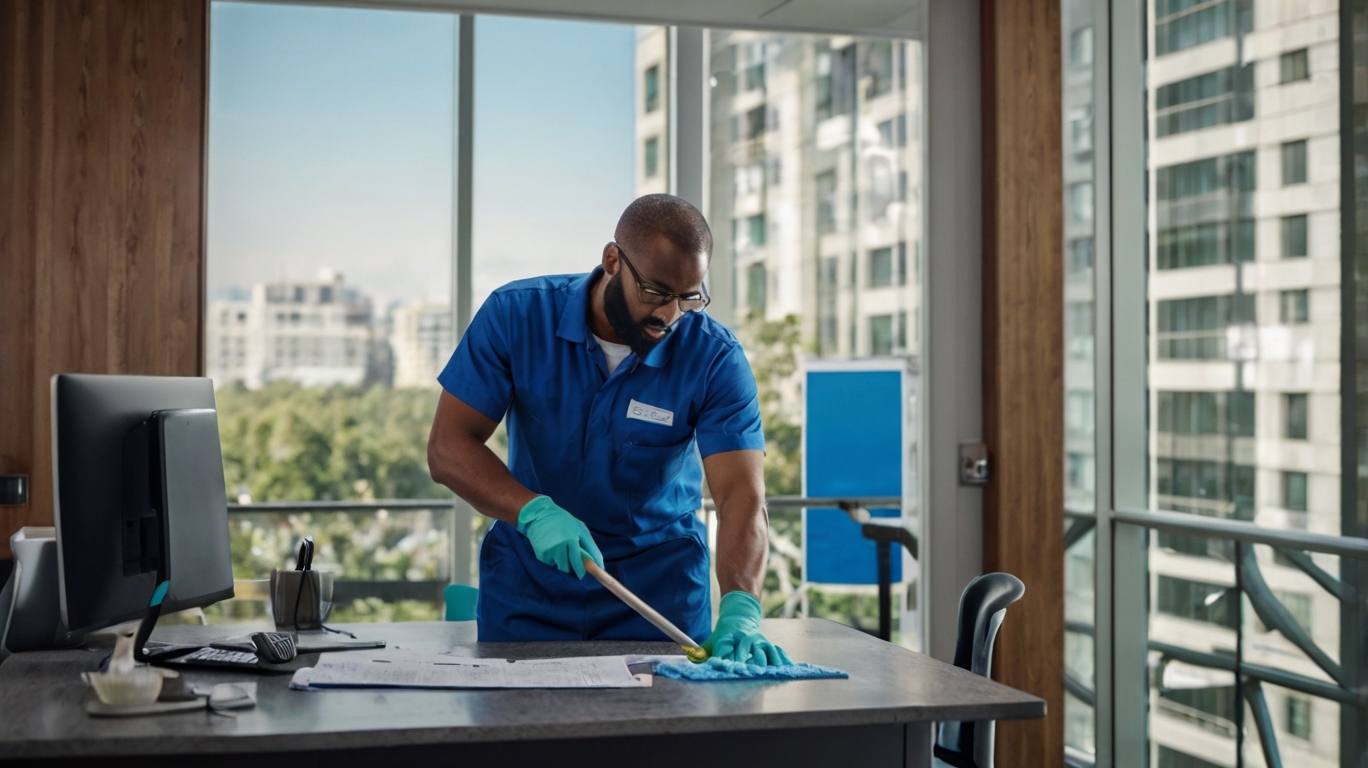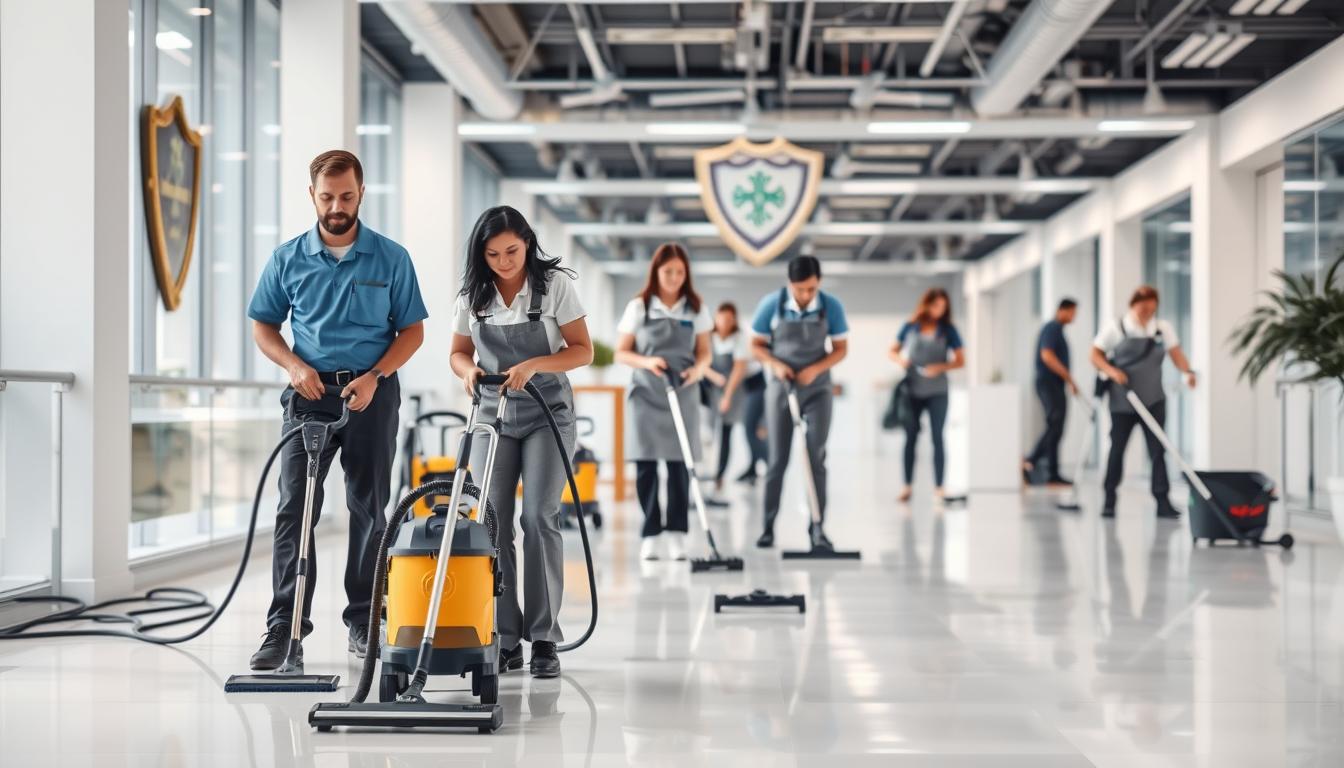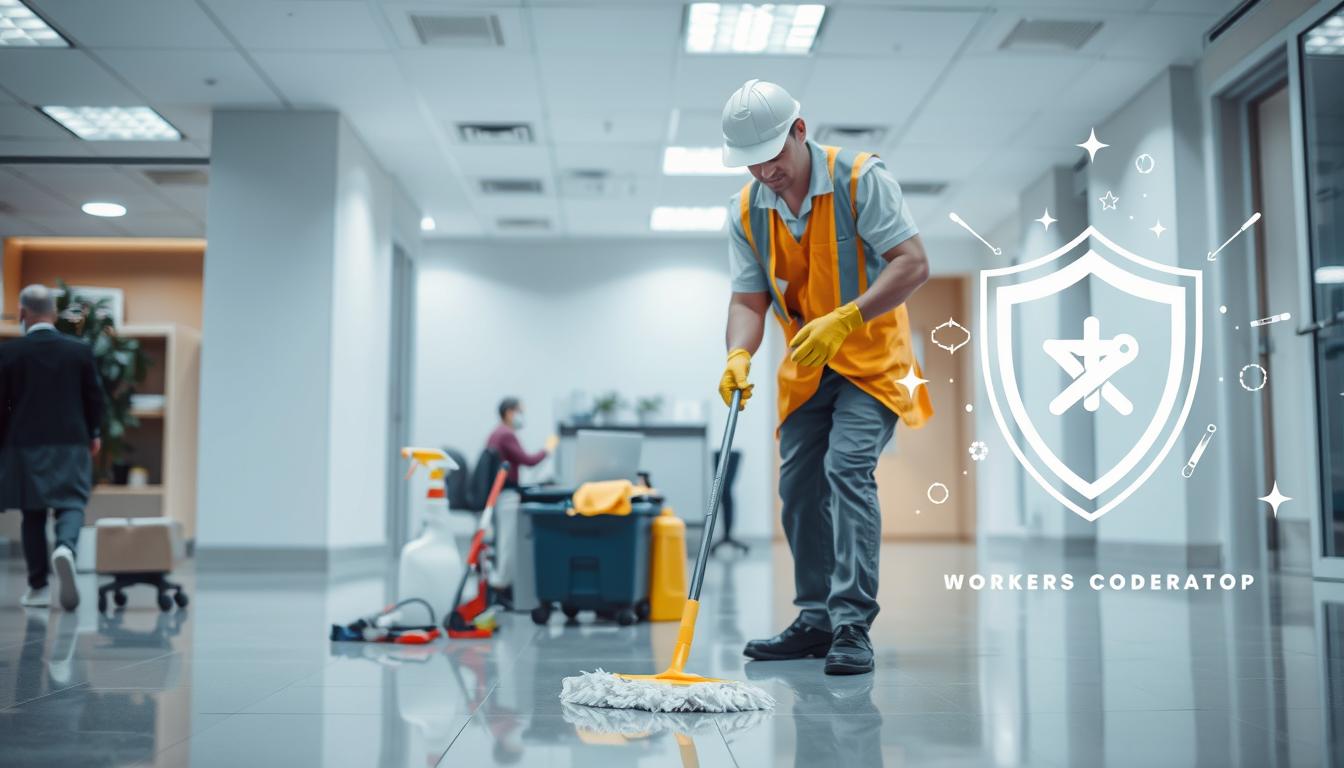Running a cleaning business comes with risks. One key protection is workers’ compensation insurance. It protects your employees and business from injuries or illnesses at work. In this guide, we’ll cover why workers compensation insurance for cleaning business is vital, what it includes, and how to get the right policy for your business.

Table of Contents
ToggleKey Takeaways
- Workers compensation insurance for cleaning business is a critical form of protection for cleaning businesses, covering employees in the event of workplace injuries or illnesses.
- Understanding the basics of workers’ comp coverage and why it’s essential for cleaning companies can help you make informed decisions about your insurance needs.
- Assessing the risks and common workplace hazards faced by your cleaning crews is crucial in determining the appropriate level of coverage.
- Comparing insurance providers and considering various factors can help you find the most cost-effective and comprehensive workers’ comp policy for your cleaning business.
- Ensuring compliance with state regulations and implementing risk management strategies can help you maintain a safe work environment and minimize the need to file claims.
What is Workers Compensation Insurance for Cleaning Businesses?
As a cleaning business owner, you know how vital it is to protect your employees. That’s why workers’ compensation insurance is key. It offers financial support for your cleaning crew if they get hurt or sick on the job.
Understanding the Basics
Workers’ compensation insurance is a must for most businesses, including cleaning ones. It pays for medical bills, lost wages, and more for employees hurt at work. This makes sure your janitor workers compensation coverage is ready, keeping your team and business safe.
Why It’s Essential for Cleaning Companies
- Cleaning crews face many dangers, like slippery floors, heavy lifting, and chemicals.
- Workers’ compensation covers the costs of work-related injuries or illnesses. It protects your business from lawsuits.
- Having the right insurance needs for cleaning companies shows you care about your employees’ safety. It’s a big plus when attracting clients.
By getting the right liability protection for cleaning crews, you give your employees peace of mind. You also protect your cleaning business from financial risks.
“In the cleaning industry, workers’ compensation insurance is not just a legal requirement, but a critical investment in the well-being of your team and the long-term success of your business.”
Workers Compensation Insurance for Cleaning Business
Protecting your employees is key as a cleaning business owner. Workers’ compensation insurance is a vital investment. It offers financial protection for your staff and your business. This insurance covers injuries or illnesses at work, saving your business from huge costs.
Choosing workers compensation insurance for cleaning business shows you care about your employees. It tells clients you value safety and are a trustworthy service provider. Also, it helps you attract and keep the best cleaning professionals, who want to work for a safe and secure employer.
| Key Benefits of Workers’ Compensation Insurance for Cleaning Companies |
|---|
|
Whether your cleaning business is small or large, workers compensation insurance for cleaning business is essential. It safeguards your business against the unique risks of the cleaning industry. By getting this insurance, you can focus on excellent service while ensuring a safe work environment for your employees.
“Investing in workers’ compensation insurance is not just a legal requirement, but a moral obligation to protect the people who keep our workspaces clean and healthy.”
Assessing Risks for Cleaning Crews
Running a commercial cleaning business means knowing the risks your cleaning crews face. They deal with slips, falls, and hazardous chemicals. It’s crucial to manage these risks to keep your team safe and covered.
Common Workplace Injuries and Hazards
Cleaning businesses need to watch out for common injuries and hazards. These include:
- Slips and falls on wet or uneven surfaces
- Back injuries from heavy lifting or improper lifting techniques
- Exposure to toxic chemicals or substances
- Incidents involving cleaning equipment, such as floor buffers or vacuums
- Repetitive strain injuries from prolonged use of cleaning tools
| Injury Type | Frequency | Potential Severity |
|---|---|---|
| Slips and Falls | High | Moderate to Severe |
| Back Injuries | Moderate | Severe |
| Chemical Exposure | Low | Moderate to Severe |
| Equipment-related Incidents | Low | Moderate |
| Repetitive Strain Injuries | Moderate | Mild to Moderate |
By understanding these risks, cleaning businesses can create effective risk management strategies. This helps protect employees and ensures the business’s success.
Calculating Coverage Needs
Getting the right business insurance for cleaners is key. You need to look at your crew size, services, and risks. This helps figure out how much coverage you need.
It’s wise to talk to an insurance expert. They can guide you on the right coverage and create a policy that fits your business.
When thinking about liability protection for cleaning crews, consider a few things:
- The number of employees on your cleaning staff
- The types of cleaning services you offer (e.g., commercial, residential, specialized)
- The specific risks associated with each service, such as the use of hazardous chemicals or the potential for slips and falls
- Your business’s claims history and any past incidents that have resulted in worker injuries
- The coverage limits required by your state’s workers’ compensation laws
| Factor | Impact on Coverage Needs |
|---|---|
| Workforce Size | Larger cleaning crews require higher coverage limits to protect all employees |
| Cleaning Services | Specialized or high-risk services may necessitate increased liability protection |
| Workplace Hazards | Potential for injuries or accidents can drive the need for more comprehensive coverage |
| Claims History | Past incidents may indicate the need for higher coverage limits to mitigate future risks |
| State Regulations | Compliance with mandatory workers' compensation requirements is essential |
By looking at these factors, you can make sure your cleaning business has enough workers’ compensation insurance. This protects your employees and your business.

Comparing Insurance Providers
When looking for workers’ compensation insurance for your cleaning business, it’s key to compare policies. This careful look can help you find the best coverage for your company. As you look at your options, think about these important factors:
Factors to Consider
- Coverage Limits: Check the maximum payouts for different claims. Make sure they match your company’s risks and needs.
- Deductibles: Look at the deductible amounts. See how they might affect your costs if a claim happens.
- Premium Costs: Compare the yearly premiums. Look for any discounts or special rates for cleaning companies.
- Customer Service: Find out about the provider’s reputation for handling claims well and customer satisfaction.
- Specialized Expertise: Search for insurers with experience in the commercial cleaning field. They should understand your specific risks.
By carefully comparing insurance providers, you can find the right commercial cleaning liability insurance for your business. This detailed approach helps protect your business and employees. It also ensures you’re following the law and sets your cleaning company up for success.
“Investing in the right insurance needs for cleaning companies can provide invaluable peace of mind and financial security for your business.” – Industry Expert
Liability Protection for Commercial Cleaners
As a commercial cleaning business, you need to protect more than just your cleaning crews. You also need to safeguard your company from liability risks. Commercial cleaning liability insurance is key to providing the needed protection for your crews and business.
This insurance helps shield your company from many third-party claims. These can include property damage, personal injury, and other incidents that might happen while your teams are working. It’s vital for covering legal and settlement costs, helping your business avoid expensive lawsuits.
- Comprehensive liability protection for cleaning crews can cover claims related to:
- Property damage caused during cleaning services
- Bodily injuries sustained by third parties
- Accusations of negligence or professional errors
- By investing in the right commercial cleaning liability insurance policy, you can safeguard your business against financial setbacks and focus on providing exceptional cleaning services to your clients.
“Liability insurance is a must-have for any commercial cleaning business. It provides the necessary protection to keep your operations running smoothly, even in the face of unexpected incidents.”
When looking at liability coverage, think about the unique risks your cleaning company faces. Work with a trusted insurance provider to find the right coverage for your business. This ensures your company is protected against liability claims.

Insurance Needs for Janitorial Services
Running a janitorial or custodial business needs the right insurance. These services face special risks and liabilities. Knowing your insurance needs helps protect your business.
Tailored Coverage Options
Janitorial and cleaning companies need custom insurance plans. The size of your team, services offered, and work hazards affect your coverage needs. Talk to an experienced insurance provider to find the right workers comp for janitorial services and insurance needs for cleaning companies.
Some common insurance options for janitorial businesses include:
- General liability insurance to protect against third-party claims of property damage or bodily injury
- Workers’ compensation to cover medical expenses and lost wages for employees injured on the job
- Commercial property insurance to safeguard your business assets
- Professional liability (errors and omissions) insurance for claims of negligence or mistakes in your work
- Commercial auto coverage for any vehicles used for your janitorial operations
Working with your insurance provider helps create a plan that fits your janitorial business.
“Protecting your janitorial business with the right insurance coverage is essential for long-term success and peace of mind.”

Cost-Effective Solutions for Small Businesses
For small cleaning businesses, workers’ compensation insurance can be a big worry. But, there are ways to make it more affordable. Options like group policies, adjustable deductibles, and bundling with other insurance can help. These strategies let cleaning companies protect their employees and business without breaking the bank.
One smart move is to look into group workers’ compensation insurance. By teaming up with other local cleaning companies, you can get better rates. This way, you share the cost and make sure your business is well-covered.
Another cost-saving idea is to adjust your deductible levels. A higher deductible can mean lower premiums. This lets you find a balance between coverage and budget, fitting your cleaning company’s needs.
Also, bundling workers’ compensation with other policies can save money. Insurance companies often give discounts for bundling. This makes it a smart way to manage your business insurance for cleaners.
“Investing in the right workers’ compensation coverage is crucial for the long-term sustainability of any cleaning business, regardless of its size. By exploring cost-effective solutions, small companies can ensure their employees are protected while also managing their overall insurance expenses.”
By using these strategies, small cleaning businesses can afford workers’ compensation insurance. This way, you can grow your business while keeping your employees safe. It’s all about finding the right balance.
Risk Management Strategies
Keeping a safe work environment is crucial for cleaning businesses. It helps avoid workplace injuries and illnesses. By using good risk management, cleaning companies can protect their workers and lower workers’ compensation insurance costs.
Promoting a Safe Work Environment
Teaching safety training to commercial cleaners is a big part of risk management. This training covers how to use personal protective equipment (PPE) right. It also teaches safe chemical handling and how to avoid musculoskeletal disorders.
Keeping the work area clean and organized is also key. It helps prevent slips, trips, and falls, common cleaning staff workplace injury issues. Regular checks of the area, fixing hazards, and proper cleaning supply storage are vital for a safer workplace.
- Provide comprehensive safety training for employees
- Ensure the use of proper personal protective equipment (PPE)
- Maintain a clean and organized work environment
- Regularly inspect the work area and address potential hazards
- Properly store and dispose of cleaning supplies
By following these steps, cleaning businesses can keep their workers safe. This reduces the number and severity of injuries. It also lowers workers’ compensation insurance costs, making the business more sustainable.
Streamlining the Claims Process
When a workplace injury or illness happens, the claims process can be complex and slow. This is true for janitor workers compensation coverage and cleaning staff workplace injury coverage. Cleaning businesses can make this process easier and reduce downtime.
By teaming up with their insurance provider, cleaning companies can set up clear steps and ways to communicate. This helps claims get handled quickly and efficiently. It also makes sure employees get the care they need and keeps the business running smoothly.
- Work with the insurance provider to make a simple claims process. Outline the main steps and who does what.
- Choose someone in the cleaning business to be the main contact with the insurance company. This makes communication smooth.
- Teach employees about the claims process. This helps them report incidents and get medical help fast.
- Keep detailed records of any workplace incidents. Include what happened, medical treatment, and costs.
- Check the claims process with the insurance provider often. Look for ways to make it better and faster.
By being proactive and working together, cleaning businesses can reduce the impact of workplace injuries or illnesses. This ensures employees get the care they need and keeps the business financially stable.
“Streamlining the claims process is essential for cleaning businesses to maintain operational efficiency and support their valued employees during times of need.”
Leveraging Insurance for Business Growth
Running a successful cleaning business means having the right business insurance for cleaners. It’s not just a must-have but a growth tool. A strong safety record and risk management commitment can lead to better insurance rates. This frees up resources for other business areas.
Insurance can help clean up operations and cut costs. Working with insurance providers can pinpoint risk areas. This leads to safety measures like training and new equipment. Such steps prevent accidents and lower insurance costs, saving money for strategic investments.
The insurance needs for cleaning companies go beyond workers’ comp. Liability coverage is crucial for taking on big clients or expanding services. It adds security, making a business stand out and opening up new growth paths.
Understanding insurance needs for cleaning companies and teaming up with good providers is key. This way, insurance becomes a strategic asset. It ensures compliance, mitigates risks, and opens doors for growth, boosting market position and long-term success.
“Investing in the right insurance solutions can be a game-changer for cleaning businesses looking to expand and thrive in today’s competitive landscape.”
In summary, the secret to using insurance for growth is being proactive and strategic. By optimizing their business insurance for cleaners, companies can find new chances, streamline, and aim for lasting success in the cleaning world.
Conclusion
Getting workers’ compensation insurance is key for cleaning businesses to protect their workers and company. It’s important to know how it works, understand your risks, and pick the right insurance. This way, your business can deal with injuries and illnesses well.
This insurance does more than just protect your team. It also helps your business grow and succeed. It’s a big step towards making your cleaning business strong.
Workers’ compensation insurance is vital for any cleaning business, big or small. It keeps your business and employees safe. By choosing the right policy, you give your team the security they need. This helps your business grow and thrive in the long run.
Having the right workers’ compensation coverage helps in many ways. It reduces liability risks and makes handling claims easier. By staying informed and proactive, your cleaning business can face any challenge. This lets you focus on providing great service and expanding your business.
FAQ
What is workers’ compensation insurance for cleaning businesses?
Workers’ compensation insurance protects employees who get hurt or sick at work. It’s key for cleaning businesses because they face many hazards. This insurance covers medical costs, lost wages, and more, keeping employees safe and your business from lawsuits.
Why is workers’ compensation insurance essential for cleaning companies?
Cleaning businesses face many risks. Workers’ compensation insurance is a vital protection. It ensures your employees are cared for and your business is safe from costly injuries or illnesses.
What are the common workplace injuries and hazards faced by cleaning crews?
Cleaning crews often face risks like slips, falls, and back injuries. They might also get hurt by chemicals or cleaning equipment. Knowing these risks helps you get the right workers’ compensation coverage.
How do I calculate the coverage needs for my cleaning business?
Figuring out the right workers’ compensation coverage involves looking at several factors. These include your team size, the services you offer, and the risks you face. An insurance expert can help you find the right coverage for your business.
What factors should I consider when comparing insurance providers for my cleaning business?
When looking for workers’ compensation insurance, compare different policies. Look at coverage limits, deductibles, costs, and the provider’s reputation. This research helps you find the best policy for your business.
What kind of liability protection do commercial cleaners need?
Commercial cleaners need liability insurance to protect against third-party claims. This coverage helps with property damage, personal injury, and more. It keeps your business safe from expensive lawsuits.
What are the unique insurance needs for janitorial and custodial services?
Janitorial and custodial services have special insurance needs. The size of your team, the scope of your work, and the risks involved all matter. Talking to an insurance expert can help you find the right coverage for your business.
How do I ensure compliance with state regulations for workers’ compensation insurance?
Workers’ compensation laws vary by state. It’s crucial for cleaning business owners to know the laws in their area. Not following these laws can lead to fines and legal trouble, so it’s important to stay informed.
How can small cleaning businesses find cost-effective workers’ compensation insurance solutions?
Small cleaning businesses often worry about the cost of workers’ compensation insurance. But there are ways to make it more affordable. Look into group policies, deductibles, and bundling with other insurance to save money.
What risk management strategies can cleaning businesses implement to promote a safe work environment?
To reduce injuries and illnesses, cleaning businesses can take several steps. Provide safety training, use proper equipment, and keep the work area clean. These actions can lower insurance costs and keep your team safe.
How can cleaning businesses streamline the workers’ compensation claims process?
When injuries happen, the claims process can be slow. Work with your insurance provider to make it smoother. This ensures your team gets the care they need quickly and efficiently.
How can cleaning businesses leverage their insurance coverage to support business growth?
Workers’ compensation insurance is not just a necessity; it can also help your business grow. A strong safety record can lead to better insurance rates. This can free up money for marketing, equipment, and training, helping your business grow.